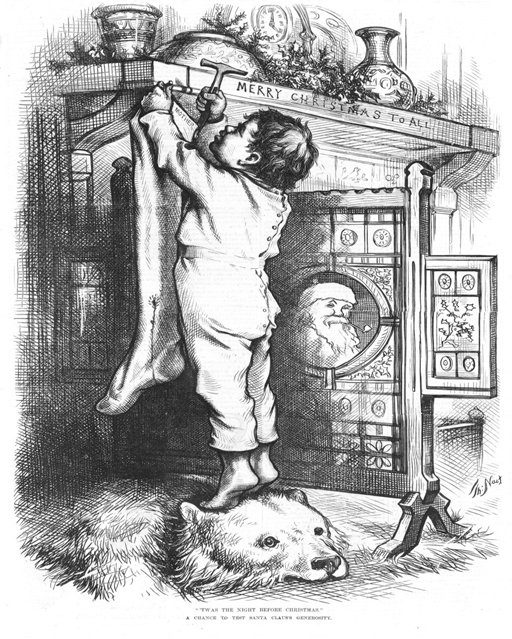Enough
When my oldest child was young, he often heard his parents say, “No, that is too much,” when he grabbed an excess of something off a buffet or wanted more ice cream than a three-year-old should have. But whenever he was asked how much of anything he wanted, he stated: “I want too much.” And that was a desire, not a confession.
We Americans love our “too much.” Recall the visual of sweater-wearing President Jimmy Carter attempting to persuade Americans to turn down their thermostats in the winter. He was pilloried. Repeatedly.
When it comes to our wants, “enough” is not in our national vocabulary,.
 The cartoon picked to accompany this blog is a Thomas Nast classic. Nast, you may know, crafted the image of what American advertising portrays as Santa Claus. In the cartoon, a little child is nailing an oversized stocking to the fireplace mantle. The caption reads “A chance to test Santa Claus’s generosity.” The top of the stocking reads “Mother,” so the child might not have been asking for themself. However, a bigger stocking to hold a greater amount is an expression of greater love. If I love you, I will give you more things.
The cartoon picked to accompany this blog is a Thomas Nast classic. Nast, you may know, crafted the image of what American advertising portrays as Santa Claus. In the cartoon, a little child is nailing an oversized stocking to the fireplace mantle. The caption reads “A chance to test Santa Claus’s generosity.” The top of the stocking reads “Mother,” so the child might not have been asking for themself. However, a bigger stocking to hold a greater amount is an expression of greater love. If I love you, I will give you more things.
That’s sick.
In my extended family, we are dealing with a family member who needed to move from a house into a much smaller space. The moved person is somewhere on a scale between a collector and a hoarder.
After dealing with thousands of decisions before an estate sale (clean, toss, sell, donate), we still have hundreds of items that need determinations. My wife and I resolved we should not leave a similar yoke on our family. In order to avoid that burden, we have to pare down to and stay at “enough”—and that is not always a simple matter.
I just finished Patrick Deneen’s 2018 book, Why Liberalism Failed. While some of his positions lean conservative, it is difficult to locate Deneen’s work on a liberal-conservative scale—a difficulty that makes it such a provocative and helpful read.
His argument: the philosophy of liberalism (e.g., which has both conservative and liberal forms but is premised on individual rights, free markets, ostensible belief in self-government and self-determination/the pursuit of happiness) contains the seeds of its own destruction. In postulating that human beings are “individuals” in our “state of nature” rather than fundamentally connected to each other, liberalism corrodes all loyalties besides to oneself.
In addition, liberalism lifts human beings out of the natural world and supports our efforts to dominate nature (e.g., industrial revolution, fossil-fuel based economy, spreading plastic trash in the air, soil, and water). Thus, we are left with individuals, the state, an a collapsing biosphere. The state must assume the regulatory and “fairness” roles of creating working rules for—and cleaning up after—all these happiness-pursuing individuals accumulating their stuff and using their excess of “freedom” to invade other’s spaces.
Liberalism fails because, in other words, human nature is fundamentally communal, we live in the world and not above nature, and there is no tradition-ing, no place to learn the virtue of self-control and of saying “I have enough.”
One of the many contradictions of modern Christianity in the U.S. is celebrating Christmas through fostering an economy of excess. In the Thomas Nast cartoon referenced above, this child is hanging a large stocking but it was still a stocking; and the stocking was the place where all the presents went. The stocking was a container for “The Enough.”
Here are two of the more anti-American teachings I know, both derived from the Bible.
In the Lord’s Prayer, there is the phrase: “Give us this day our daily bread.” Daily bread. The ask is for enough.
In Paul’s letter to the Philippians (4:11), he wrote: “I have learned to be content with whatever I have.” That is a radical statement and a stern challenge to American Christianity.
“Enough” is a word and a practice Americans nailed to the cross. “Enough” needs resurrection.
Image Credit: Thomas Nast / Engraving / Harper’s Weekly / December 30, 1876 from the Macculloch Hall Historical Museum Thomas Nast collection.
Dr. Gary Peluso-Verdend is president emeritus at Phillips Theological Seminary and is the executive director of the seminary’s Center for Religion in Public Life. The opinions expressed in this blog are those of the author. Learn more about the Center’s work here and about Gary here.


Comments are closed.